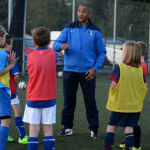Child Welfare in Football: The FA’s Safeguarding Guidelines
In light of recent developments in relation to the sexual abuse of young footballers in the UK, it is incumbent on all coaches and football administrators to ensure their club is safeguarding the children it is responsible for.
In reality, the safety and well-being of children playing the game is the responsibility of everyone. Each club, association, school and private organisation has an obligation to ensure there is a framework in place that allows children to have fun, learn and play the game safely.
Each FA-affiliated club must have at least one adult in charge of the welfare of youngsters. The FA has set out a Safeguarding Guide that details what each club and the individuals within it must do to ensure children are protected in their footballing environments.
‘Designated Personnel Officers’ work on behalf of the FA, and they must ensure that their club adheres to several safety-related procedures.
Performing necessary background checks - Clubs must ensure that all adults working with children undergo detailed background checks by the Disclosure and Barring Service (DBS).
Children must have a safe playing environment - Education and best practice advice must be given to ensure a safe playing environment for all children.
The promotion of clear safeguarding systems - Clubs must have policies, regulations and reporting procedures in place.
Designated Safeguarding Officers: What Are They?
Every club must have a Designated Safeguarding Officer in place. This person will need to undergo a full FA Criminal Records Check, and he or she will need to attend various FA safeguarding courses.
Every club must also have a ‘Safeguarding Children’ policy in place. However, there are also DSOs in every professional club, affiliated development centre, academy, centre of excellence and County FA. If you run a club that needs a DSO, you can find a policy template on the FA website. You can also get guidance on how to recruit a suitable person for the job from the FA.
Once a DSO has been appointed, he or she will be trained on the various legal guidelines for ensuring a safe environment for children. Guidance is given on how to spot the signs of distress or harm, and how to report them to the police, the FA and various other statutory bodies.
Reporting a Concern
If you or a colleague in your club has a concern about the welfare or safety of a child, inaction is simply not an option. The FA details five different ways of reporting your concerns:
- Report the matter to the County FA’s Designated Safeguarding Officer
- Report the matter to your club’s Designated Safeguarding Officer
- Email the FA Safeguarding Team
- Call the NSPCC
- Contact the police if the matter is serious and needs immediate intervention
What Happens Next?
Once your concerns have been raised, an initial assessment regarding the seriousness of the matter will be made. The risk to the child or children involved will be regarded as either ‘high and immediate’, ‘medium’ or ‘low/poor practice’.
High risk matters are escalated to the appropriate authorities — such as the police — within 24 hours. A referral should also be sent directly to the FA Safeguarding Team.
Issues regarded as a ‘medium’ risk will will handled on a case-by-case basis, but they will always be escalated to the FA Safeguarding Team. A decision will then be made whether statutory bodies, the FA or the club takes action on the matter.
Low-risk issues are often a matter of poor practice by the County FA or the club. If the issue occurs within a professional club, the DSO is responsible for dealing with the matter. Issues in grassroots clubs may be dealt with by the County FA.
It is the responsibility of each club to ensure that the FA’s policies on the welfare of children are followed and implemented. While clubs must demonstrate adherence to those guidelines to achieve affiliated status, they must also ensure that checks and controls are implemented on an ongoing basis.
Given the recent reports of abuse within the game, protecting our children from harm is more important than ever. To that end, the FA has an extensive range of resources available on its website. The FA works closely with the NSPCC, the Child Exploitation and Online Protection Centre, the Sporting Chance Clinic, the Child Protection in Sport Unit and Childline to ensure the children playing the game are safeguarded.
Only by fully investing in the FA’s safeguarding procedures can your club be confident it is doing everything it can to keep children safe.

